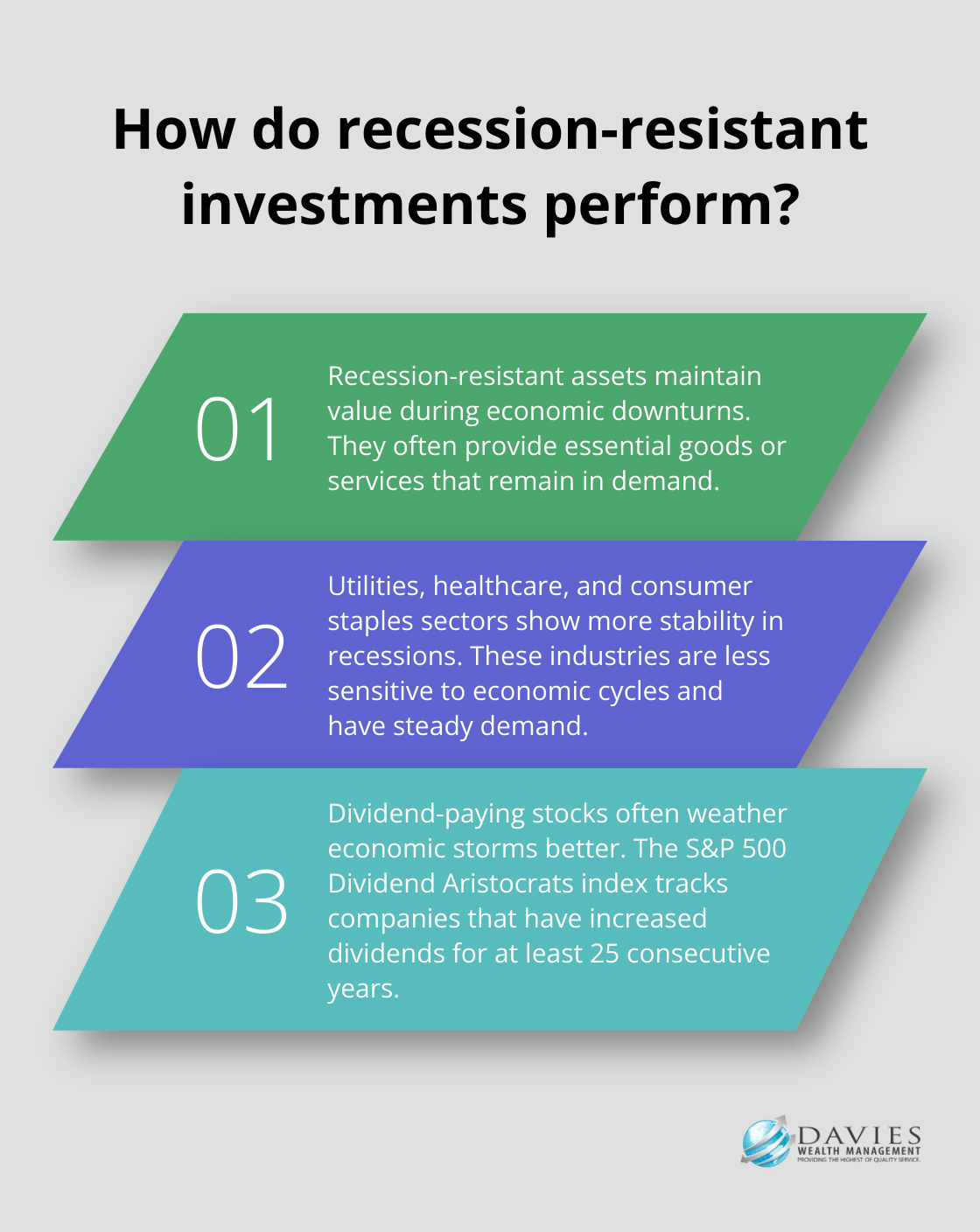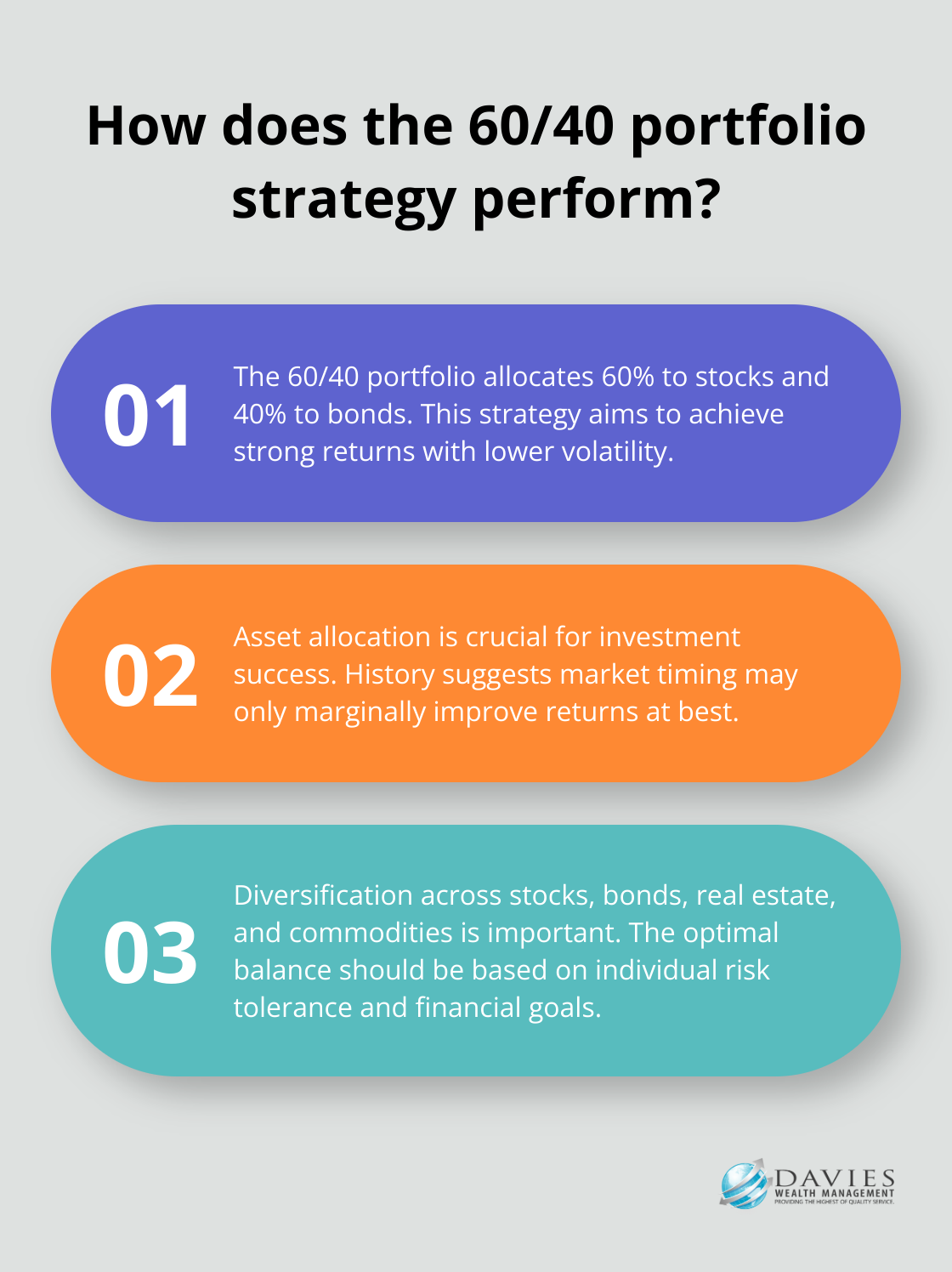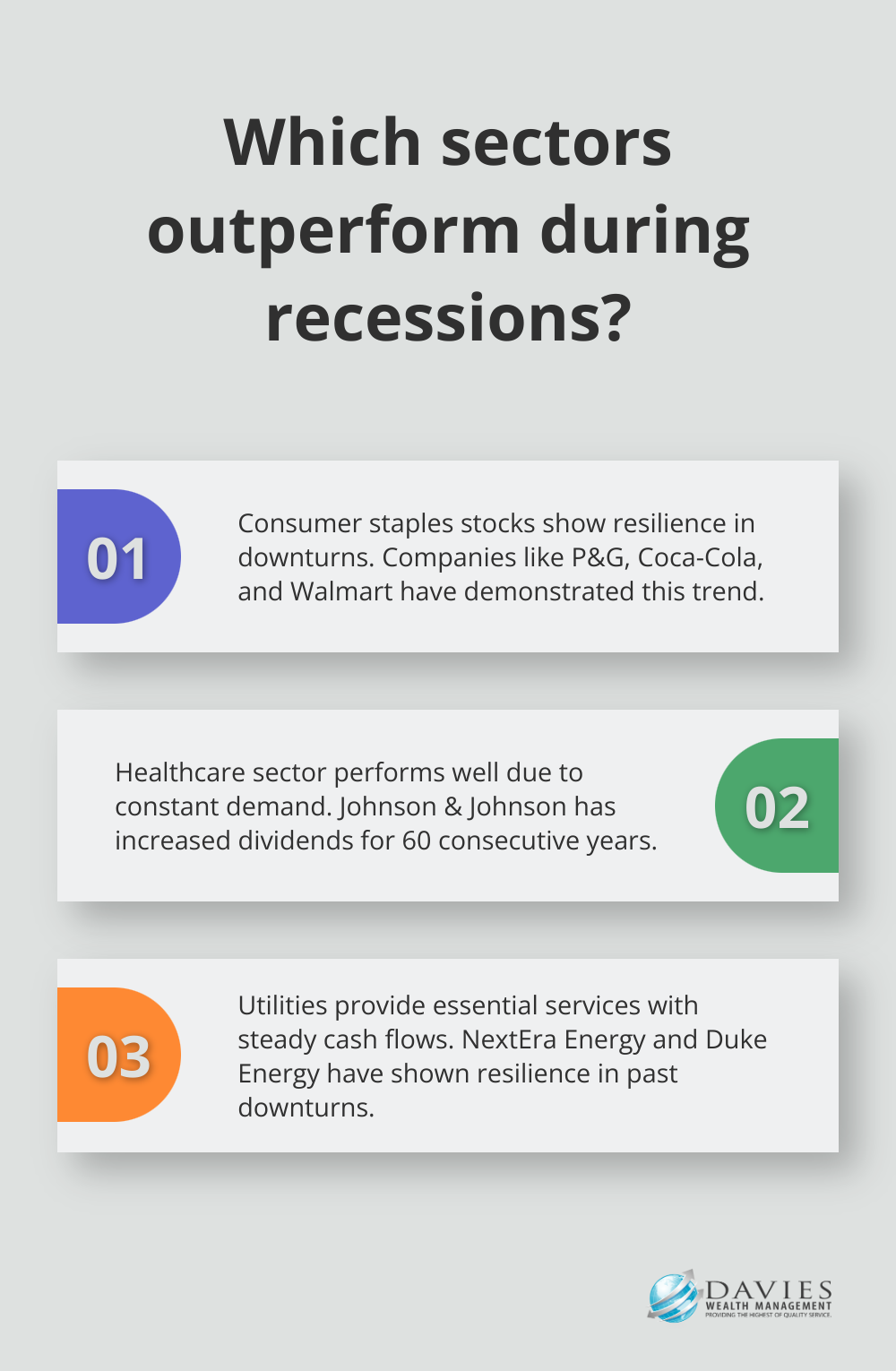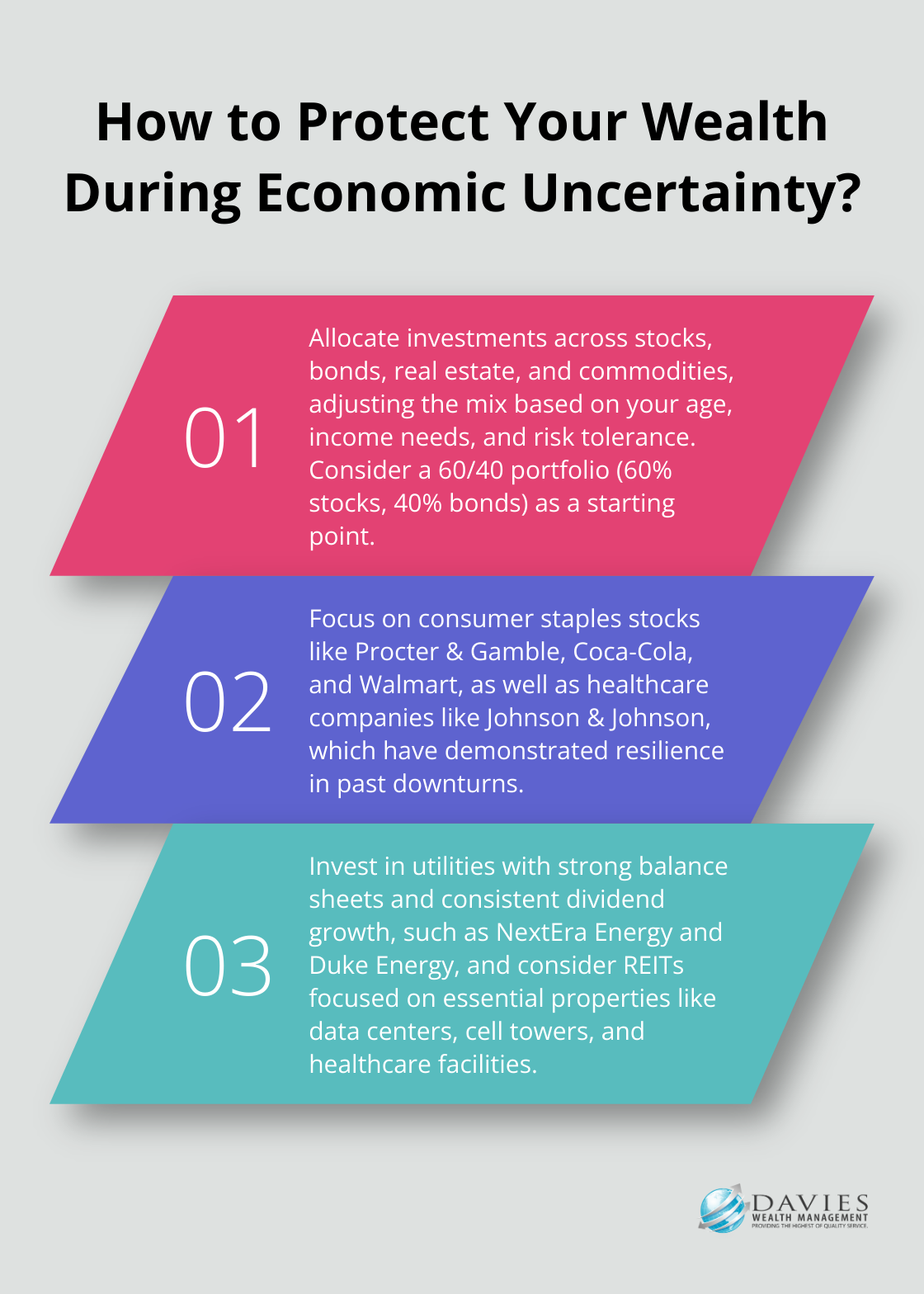Economic downturns can be challenging for investors, but with the right recession investment strategies, you can protect and even grow your wealth. At Davies Wealth Management, we understand the importance of preparing your portfolio for various market conditions.
In this post, we’ll explore effective approaches to navigate a recession, including diversification tactics and recession-resistant asset classes. We’ll also discuss specific sectors that tend to perform well during economic slumps, providing you with practical insights to strengthen your investment strategy.
Understanding Recession-Resistant Investments
Defining Recession-Resistant Assets
Recession-resistant investments are assets that maintain their value or appreciate during economic downturns. These investments often provide essential goods or services that remain in demand regardless of economic conditions. Utilities, healthcare, and consumer staples sectors have historically demonstrated more stability during recessions.
Characteristics of Stable Investments
Recession-resistant assets typically share certain characteristics:
- Steady demand: Products or services that people need regardless of economic conditions
- Strong balance sheets: Companies with low debt and healthy cash flows
- Consistent cash generation: Businesses that can maintain profitability even in challenging times
- Defensive nature: Industries that are less sensitive to economic cycles
Dividend-Paying Stocks: A Reliable Income Source
Companies with a history of consistent dividend payments often weather economic storms better than their non-dividend-paying counterparts. These firms usually have strong balance sheets and steady cash flows, which allow them to maintain dividend payments even in challenging times. The S&P 500 Dividend Aristocrats index (which tracks companies that have increased dividends for at least 25 consecutive years) has shown strong performance over time.
Historical Performance of Asset Classes
Certain asset classes have shown resilience during recessions:
- U.S. Treasury bonds: Often considered a safe-haven asset, Treasury bonds have typically performed well during economic downturns.
- Gold: This precious metal has historically performed well during recessions.
- Defensive sector stocks: Utilities, healthcare, and consumer staples have often outperformed the broader market during economic slumps.
As we move forward to discuss diversification strategies, it’s important to consider how these recession-resistant investments can play a role in creating a balanced portfolio that can withstand economic turbulence while positioning for growth during recovery periods.

How to Diversify Your Portfolio for Recession Protection
The Importance of Asset Allocation
Diversification stands as a fundamental principle of sound investment strategy, particularly when preparing for economic downturns. Asset allocation plays a critical role in managing risk and returns. History suggests that, at best, you may marginally improve returns through market timing. At worst, you could drastically lower returns, highlighting the significance of asset allocation in investment success.

To protect against recessions, consider allocating your investments across:
- Stocks: High-quality, dividend-paying companies in defensive sectors
- Bonds: A mix of government and high-grade corporate bonds for stability
- Real Estate: REITs for income and potential appreciation
- Commodities: Gold and other precious metals as hedges against economic uncertainty
Striking the Right Balance
The key to successful diversification lies in finding the optimal balance for your risk tolerance and financial goals. Bonds typically offer more stability during recessions but may limit growth potential during recoveries. Stocks can provide higher returns but come with increased volatility.
A common approach is the 60/40 portfolio (60% in stocks and 40% in bonds). This strategy remains key for achieving strong returns with lower volatility, underlining the importance of resilience and long-term perspective. However, this traditional allocation doesn’t suit everyone. Your asset mix should adjust based on factors such as age, income needs, and risk tolerance.
Global Diversification for Added Protection
International diversification can further spread risk and capture growth opportunities worldwide. Try to allocate a portion of your portfolio to:
- Developed market stocks and bonds
- Emerging market equities
- International real estate
(Be mindful of currency risks and geopolitical factors when investing internationally.)
Alternative Investments for Enhanced Diversification
Alternative investments can provide additional diversification benefits and potentially higher returns. These may include:
- Private equity
- Hedge funds
- Commodities
- Structured products
(While alternatives offer unique advantages, they often come with higher fees and less liquidity.)
As we move forward to explore defensive sectors and investment opportunities, it’s essential to consider how these diversification strategies can work in tandem with specific industry focuses to create a robust, recession-resistant portfolio.
Where to Invest During a Recession
Consumer Staples: Necessity Trumps Luxury
Economic downturns prompt people to cut back on discretionary spending while continuing to buy essentials. This trend makes consumer staples stocks a popular choice for investors. Companies like Procter & Gamble, Coca-Cola, and Walmart have demonstrated resilience in past downturns. Consumer discretionary, industrial, financials and healthcare sectors had cash ratios above the levels seen in 2008, according to S&P Global.
Healthcare: An Aging Population’s Lifeline
The healthcare sector often performs well during economic slumps. The demand for medical services and pharmaceuticals remains relatively constant, regardless of economic conditions. Johnson & Johnson, for example, has increased its dividend for 60 consecutive years, showcasing its ability to generate consistent cash flow even in tough times.
Utilities: Powering Through Downturns
Utilities provide essential services that people need in any economic climate. This consistent demand translates to steady cash flows and often attractive dividends. The utilities sector has historically offered lower volatility compared to the broader market.

When evaluating utilities, investors should look for companies with strong balance sheets and consistent dividend growth. NextEra Energy and Duke Energy are examples of utilities that have shown resilience in past downturns.
REITs: Real Estate’s Recession-Resistant Corners
While real estate can be cyclical, certain types of Real Estate Investment Trusts (REITs) have shown resilience during recessions. REITs focused on essential properties like data centers, cell towers, and healthcare facilities tend to perform well. American Tower, a cell tower REIT, has increased its dividend every quarter since 2012, even through economic challenges.
Precious Metals: The Traditional Safe Haven
Gold and other precious metals often shine during economic uncertainty. Investors view them as a store of value and a hedge against inflation. (However, it’s important to note that precious metals don’t provide income and can be volatile in the short term.)
Successful investing during a recession doesn’t mean completely avoiding risk – it requires intelligent risk management. Diversification across these defensive sectors and maintaining a long-term perspective can position a portfolio to weather the storm and potentially emerge stronger on the other side. Conducting thorough investment analysis can help uncover opportunities even in challenging economic times.
Final Thoughts
Recession investment strategies require a tailored approach. Your unique financial situation, risk tolerance, and long-term goals should shape your investment decisions during economic downturns. What proves effective for one investor might not suit another, so personalization is key.

Davies Wealth Management offers expert guidance to navigate economic uncertainties. Our team develops personalized investment plans, including investment management, retirement planning, and tax-efficient strategies. We assist professionals, athletes, and individuals in building, protecting, and transferring wealth confidently (even during challenging economic times).
Recessions present opportunities for well-prepared investors. Sound recession investment strategies and experienced financial advisors can help you weather economic storms. For personalized advice on navigating various economic conditions, contact Davies Wealth Management to create a robust financial plan that withstands market fluctuations.



Leave a Reply